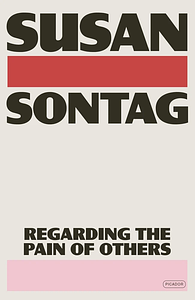Take a photo of a barcode or cover
This book by Susan Sontag focuses on the representation of pain through various visual mediums. It records the differences in the conceptualisation and representation of pain (of others) that came into being with the emergence of photography. This book also explores the different developmental stages of war photography. The philosophy expounded by Sontag on photography and pain in this book is subtle yet profound. It helps the reader to formulate a new and critical perspective on the representation of pain (of others) in photographs, which becomes particularly relevant in the digital of twenty-first century in which there is media saturation as we are constantly bombarded with visual content that makes us numb, passive and undiscerning consumers.
My rating: 4 stars
My rating: 4 stars
The most important and relevant book I've read this year so far.
informative
reflective
slow-paced
“No Committee of Guardians is going to ration horror, to keep fresh its ability to shock. And the horrors themselves are not going to abate.”
“Someone who is perennially surprised that depravity exists, who continues to feel disillusioned (even incredulous) when confronted with evidence of what humans are capable of inflicting in the way of gruesome, hands-on cruelties upon other humans, has not reached moral or psychological adulthood.
No one after a certain age has the right to this kind of innocence, of superfi-ciality, to this degree of ignorance, or amnesia.”
“Someone who is perennially surprised that depravity exists, who continues to feel disillusioned (even incredulous) when confronted with evidence of what humans are capable of inflicting in the way of gruesome, hands-on cruelties upon other humans, has not reached moral or psychological adulthood.
No one after a certain age has the right to this kind of innocence, of superfi-ciality, to this degree of ignorance, or amnesia.”
challenging
dark
informative
medium-paced
challenging
informative
reflective
medium-paced
informative
reflective
A short and thought-provoking critical analysis about the power and limitations of the news media (specifically photos and videos) that we are exposed to every day. What does it mean to witness the suffering of others? What moral action should it provoke, if any? I felt greatly moved by large parts of this and the criticisms within seem all the more important in the age of social media.
I do feel that the arguments could have been better organized and that certain parts of the text were repetitive.
I do feel that the arguments could have been better organized and that certain parts of the text were repetitive.
challenging
dark
reflective
medium-paced
Thought provoking and astute insights. Recommended for people even if they don’t have any knowledge of photography like me. Increasingly relevant in the 21st century. Sometimes I felt generic claims were made without it being clear whether Sontag was making them sincerely or whether she was ventriloquising other people or being ironic. If she was being sincere in these instances they were not backed up with reasoning or evidence- clarity on this would have been more compelling. I also think reference images would be so useful for the discussions of specefic photos. Good scope of wars covered and how they relate to different facets of her arguments. Saying that there wasn’t one clear line of argument and was more different musings on the genre.
informative
reflective
fast-paced
Expected a different approach, this just reads like a spin-off of On Photography.
I thought this would be less about empathy created through photos and more about the general apathy epidemic which we're experiencing in the modern world.
As always, some great points were made by Sontag but the bigger picture (pun intended) feels repetitive when one has read her previous work.
I thought this would be less about empathy created through photos and more about the general apathy epidemic which we're experiencing in the modern world.
As always, some great points were made by Sontag but the bigger picture (pun intended) feels repetitive when one has read her previous work.
challenging
informative
reflective
slow-paced




